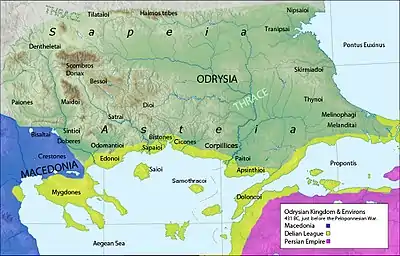Bisaltae
The Bisaltae (Greek: Βισάλται) were a Thracian people on the lower Strymon river, who gave their name to Bisaltia, the district between Amphipolis and Heraclea Sintica (the modern village of Rupite, Bulgaria) on the east and Crestonice on the west. They also made their way into the peninsulas of Acte and Pallene in the south, beyond the river Nestus in the east, and are even said to have raided Cardia.

About 500 BC they issued some silver coins bearing the name of their tribe. Under a separate king at the time of the Persian Wars, they were annexed by Alexander I (498 BC-454 BC) to the kingdom of Macedon. At the division of Macedon into four districts by the Romans after the battle of Pydna (168) the Bisaltae were included in Macedonia Prima.
Plutarch, in his Life of Perikles, says that the Athenians established a colony ("cleruchy")"a thousand to dwell among the Thracian tribe of the Bisaltae." This colony was meant to strengthen Athen's hold over the wealthy region around Amphipolis, which would become a major battleground in the Peloponnesian War.
Their country was rich in figs, vines and olive trees; the silver mines in the mountain range of Dysorum brought in a talent a day to their conqueror Alexander. The Bisaltae are referred to by Virgil in connection with the treatment of the diseases of sheep. The fact that their eponym is said to have been the son of Helios and Ge points to a very early settlement in the district.
References
- A History of Macedonia: 550-336 B.C by N.G.L. Hammond v. 2 pages 77, 81, 117 ISBN 0-19-814814-3
- D. C. Samsaris, Historical Geography of Eastern Macedonia during the Antiquity (in Greek), Thessaloniki 1976 (Society for Macedonian Studies), p. 54-56. ISBN 960-7265-16-5